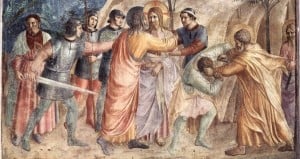 The Remarkable Story of St. Mark – 2 Timothy 4:9-22
The Remarkable Story of St. Mark – 2 Timothy 4:9-22
Because of the extraordinary ministry and character of St. Paul, it is possible at times to get the impression that Paul was in the ministry alone. But when you read passages like 2 Timothy 4:9ff, you realize how many co-laborers in the faith Paul really had. Of these, Timothy himself was probably the most important (at this stage of Paul’s ministry), but Titus, another important church leader is mentioned, as are the famous Prisca and Aquila. In fact, in every city, St. Paul or other apostles had ordained elders to pastor and rule the local church, and in every city there was a church with ordained elders to be the Body of Christ in that city. ↓
The things that Paul teaches about the nature of the Church as the Body of Christ and presence of Christ in the world turns out to be true in the ministry of St. Paul and in the early church.
But there is a dark side to the ministry of St. Paul – not in terms of Paul himself but in terms of his co-laborers. It is a sobering thought to realize how many of Paul’s co-laborers abandoned his ministry and in abandoning Paul abandoned Christ: how we treat the Body of Jesus Christ, His holy Bride, is how we treat Jesus Christ Himself.
In 1 Timothy 1:20, we read of Hymenaeus and Alexander who suffered shipwreck concerning the faith. In 2 Timothy 1:15 Paul states that all those in Asia had turned away from him, including Phygellus and Hermogenes. Hymenaeus is worthy of double shame because he appears in 2 Timothy 2:17 again, this time with his co-abandoner of the faith, Philetus. Here in 2 Timothy Paul adds Demas and Alexander to the Hall of Shame. No wonder Paul found that in his day (which he appears to think are the last days), men will be lovers of themselves and lovers of pleasure rather than God and will turn away from the true Word.
Like his Master, Jesus, St. Paul was abandoned by some of his closest companions. At his first defense, no one stood with him, but all forsook him (verse 16.)
Sometimes pastors and priests find their labors lonely like Paul’s. We begin good works at our churches, faithfully teach, lead the charge, and when we turn around we wonder where everyone went. Or we find people in whom we have invested much, deciding to leave us for no apparent reason.
But hidden in today’s lesson is a wonderful story of the restoration of one who had abandoned St. Paul: John Mark. This John Mark, or simply Mark, was a relative of the early apostle, St. Barnabas, and was honored to be selected as a companion of the two great apostles, Barnabas and Paul. However, Mark had turned back from the labor to which he had been called at Pamphylia (Acts 13:13). St. Luke (who was the only one who remained with Paul in 2 Timothy 4:10) records this betrayal in subdued words and yet words that should chill and haunt us if we imagine they were spoken of us: he “had not gone with them to the work” (Acts 15:38.)
How would you like it to be said of you that your faith had been shipwrecked or that you had opposed sound teaching or a godly leader of the church? While God’s judgment on Mark is less because Mark’s abandonment of the gospel was less, would we like it to be recorded of us that we had not gone to do the work that God had commissioned us to do? It’s a sobering thought that we all should take seriously.
But thank God that Mark’s story didn’t stop there. Actually, it gets does get worse before it gets better, because Mark’s cowardice or selfishness caused a division two years later between Paul and Barnabas (Acts 15:39). Those who turn from the faith or those who go AWOL in God’s army do more harm to the Body of Christ than they know. And those who say they are of Christ but do not do the work of Christ they know they should do help make the Body sick or weak.
In Colossians 4:10 and Philemon 23, we first hear a very quiet but very dramatic change in Mark. Now, 11 years later, Paul can say that Mark, along with Luke, is one of his “fellow laborers.” We don’t know what happened in young Mark’s life, except to say that he had been restored to the ministry of the gospel by the grace of God.
But the best is saved for last, for here in 2 Timothy 4:11 Paul writes to Timothy: “Get Mark and bring him with you, for he is useful to me for ministry.” How would you like to have that recorded of your life – that you were useful in ministry to a great apostle? What about listening for the words from your Master: “Well done, thou good and faithful servant”? These are the words we should labor to hear when at the end of our lives.
Mark’s remarkable story makes me wonder how many St. Marks are out there in our churches or even among you. How many are those who are turning away from labor in God’s kingdom? How many are those who have been restored to confidence? And how many, if so restored, will become great leaders and saints?
There is one, final, aspect of Mark’s restored ministry, as he returned to do the work the Lord had given him: he was privileged to be one of only four Gospel writers. This same Mark, who had abandoned Paul when younger, is St. Mark, the writer of a Gospel of Jesus Christ. Every time we read his Gospel, we should be reminded of the grace of God in his life and ours.
In leaving Sts. Paul and Mark, there is one final wonder to behold. When Paul is writing to Timothy to send Mark to him, he is in prison and had undergone his first defense, at which time all had forsaken him (verse 16), as all had forsaken Christ at His trial. When Paul sends for Mark, because he is useful to his ministry, it almost like a last request, for shortly thereafter, Paul was probably executed by Nero.
Paul writes in 2 Timothy 4:6 that his departure was at hand. But Paul doesn’t write like a man in prison who is about to be executed! Like Christ, who on the eve of His betrayal washed the feet of His disciples and prayed for them, Paul is a faithful minister to the end. Paul, who so deeply loves the churches to whom he was called to minister, faithfully instructs Timothy on how to govern the churches.
1 and 2 Timothy, then, are really Paul’s last request. Notice that there is nothing of himself in his request, only a heart full of love for Christ through a love for His Church and His ministers. His last request, which I think is both of these entire books, is that Timothy (and we) keep the faith and hold to the apostolic teaching for which he lived and for which he died.
Paul’s request, which Jesus is making through him to you this day, is that you prove a minister who is useful in the ministry of Jesus Christ, to whom be glory forever and ever! Amen!
Prayer: Father, we thank You that You have entrusted the ministry of Your Son through Your Spirit to men like St. Paul, St. Timothy, and St. Mark. Strengthen me today, that I would not be of those who shrink from the fight or turn back out of cowardice or selfishness. Deliver me from every evil work and preserve me for Your heavenly kingdom, through Jesus Christ our Lord. Amen.
Points for Meditation:
- Spend some time reflecting on the progression of Mark’s life, both his abandonment of the ministry and the glory of his restoration and God’s grace in his life. Imagine what ministry God might be calling you to, if you proved faithful.
- Meditate on the life of Paul. What would it have taken for Paul to have led such a life that when on the point of death all he could think about was the good of the churches and the teaching of the Word of God? In what ways is God calling you to be more like St. Paul?
Resolution: I resolve to prayerfully consider the ministry the Lord has given me today and how faithful I have been at what He has given me to do.











